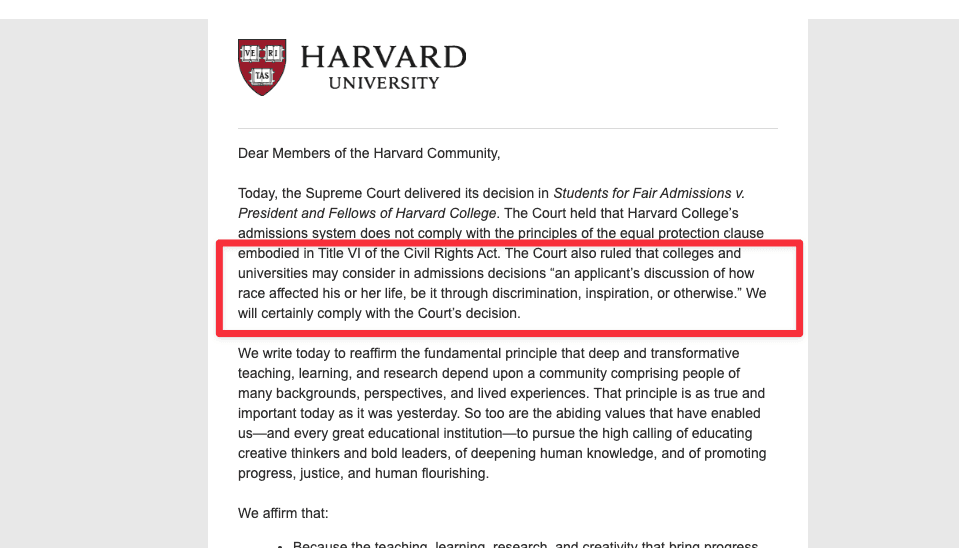Applying to College
The Supreme Court, Affirmative Action, and The Future of College Admissions
We delve into the Supreme Court's recent decision declaring Affirmative Action unconstitutional, and what it means for the future of college admissions.
Jul 4, 2023

Landmark Decision: Affirmative Action Ruled Unconstitutional
In a recent landmark decision, the Supreme Court of the United States has declared Affirmative Action in college admissions unconstitutional. This ruling has far-reaching implications for the way universities across the country select their students. From now on, race cannot be explicitly considered as a factor in admissions. The new landscape for college admissions may seem unclear, but this does not imply an end to diversity in higher education.
In this blog, we'll go over what Affirmative Action is, why it was so important, and what you can do now after the ruling.
Understanding Affirmative Action: A Measure for Equality
Affirmative Action emerged as a policy instrument designed to counteract the deeply entrenched racial and ethnic discrimination present in many aspects of American society, including education. One of its key applications has been in the realm of college and university admissions, where it has played a significant role in shaping student bodies. Under this policy, institutions of higher learning were able to consider race as one of many factors when evaluating applicants for admission. This was not a practice of giving preferential treatment based on race, but rather an attempt to acknowledge the historical and systemic barriers that students from certain racial and ethnic groups have had to overcome.
The overarching aim of Affirmative Action was to create a level playing field for students of all backgrounds. By considering an applicant's race alongside other factors like academic performance, extracurricular activities, and personal essays, colleges and universities were able to build more diverse and representative student bodies. A more diverse student body not only reflects the multicultural reality of our world but also fosters a vibrant academic community where different perspectives thrive. Students benefit from exposure to a wide range of experiences, backgrounds, and viewpoints, creating an enriching learning environment that goes beyond the standard academic curriculum. Through such interactions, students prepare for the globalized, diverse workforce that awaits them after graduation.
The Supreme Court's ruling does not mean that universities will now ignore the experiences and challenges that students of diverse backgrounds bring. In fact, even without Affirmative Action, institutions like Harvard have already begun to discuss how they will adjust their admissions process to this new legal environment.

How will college admissions change now?
While race can no longer be a direct factor, the context in which a student has lived and learned can and will still be considered. This includes understanding the challenges that individual students may have faced, which could be a result of their racial or ethnic background. The ruling does not eliminate the recognition of systemic racism and its impacts, but simply changes the way schools can respond to it.
For example, a student who has overcome economic hardship, attended under-resourced schools, or has demonstrated exceptional resilience in the face of adversity, will continue to be recognized for their achievements and potential. In many cases, these hardships may correlate with racial and ethnic lines due to the entrenched systemic disparities in our society. Hence, the experiences shaped by race, even if indirectly, can still influence a student's profile in the admissions process.
Furthermore, universities can still execute other strategies to maintain and increase diversity. They can increase outreach efforts to underrepresented students, offer scholarships based on economic need, and intensify support for first-generation college students. All of these actions can help to ensure that a broad spectrum of experiences and perspectives are represented on campus.
Conclusion
In conclusion, the Supreme Court's landmark ruling on Affirmative Action signifies a significant shift in how universities will approach admissions. While it may have altered one method of understanding an applicant's unique context and experiences, it does not mark the end of efforts to foster a diverse student body. More than ever, universities like Harvard and others will value the personal narratives and unique experiences that each applicant brings to the table.
In this new landscape, the ability to communicate one's story effectively through essays will become increasingly pivotal. The personal essay will be an essential platform for students to articulate their experiences, challenges, and accomplishments that may not be immediately apparent from grades or test scores.
With this in mind, consider utilizing Delilah, an AI-powered essay writing assistant, to help you craft a compelling and authentic personal story. This free tool can guide you in refining your essay, making your application stand out. Regardless of the changes in admissions policies, your unique story holds value and potential to contribute to the diversity and richness of higher education, and Delilah is designed to ensure it's told effectively.